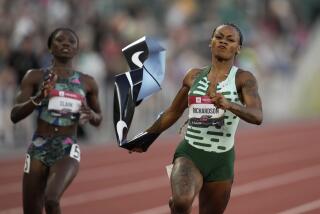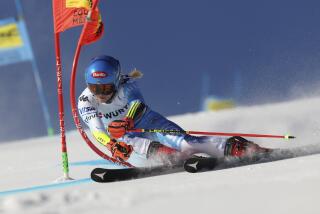Success means different things to different Olympians
LONDON — Moments after running the fastest 5,000 meters of her life, Kim Conley stepped off the track at Olympic Stadium with a weary smile and a hint of a wave.
“That was hard,” she said, still catching her breath. “I didn’t expect it to be as fast from the beginning.”
For a woman who had barely made the U.S. team this summer, competing in the 2012 London Olympics was almost too much to comprehend.
Crouching at the starting line with some of the best runners in the world. Eighty thousand people in the stands, the cheers building down the homestretch.
“A dream come true,” she called it, adding: “I ran as fast as I could.”
Fast enough to shave five seconds off her previous best time.
Fast enough to finish 22nd in a preliminary round of 34.
--
Gold-medal winners weren’t the only ones who felt the thrill of victory in London. And the losers did not always agonize.
For the athletes who competed the past 16 days, it was largely about expectations.
While superstars such as Usain Bolt and Michael Phelps commanded the spotlight, lesser contenders gladly took any spot on the podium they could manage. Thousands more weren’t even thinking about medals.
Many of the nearly 11,000 competitors in 302 events knew they stood no real chance, so they set smaller goals, determined to run a little faster or jump a little higher.
“There are absolutely different ways to approach the Olympics,” said Leah Lagos, a New York sports psychologist. “And there’s no right or wrong.”
Athletes spoke of trying to enjoy the experience, taking photographs around the Olympic village and chatting with competitors from other nations. They danced at the closing ceremony.
But not everyone walked away from the Games with a smile. In a realm where every moment is measured or judged, dealing with expectations can be difficult.
“Athletes can set themselves up for disappointment,” Lagos said. “There can be an enormous amount of stress.”
--
The final point left Jake Gibb standing with hands on hips, Sean Rosenthal on his knees in the sand. Seconds passed, the men remaining absolutely still.
“A tough one,” Rosenthal said.
On paper, losing in the quarterfinals of beach volleyball wasn’t so horrible.
Gibb and Rosenthal came in as the second-ranked American team behind defending Olympic champions Todd Rogers and Phil Dalhausser. They needed a string of victories on the world tour this spring just to qualify.
Still, that hot streak sent them to London feeling confident, and when Rogers and Dalhausser unexpectedly lost in the round of 16, Gibb and Rosenthal sensed an opportunity.
“I really thought we were going to win a medal,” Gibb said. “I just had that feeling.”
The quarterfinal match pitted them against a team from Latvia that was seeded lower but had given them trouble in the past. Gibb and Rosenthal started fast, winning the first set. But after that, the Latvians swung the momentum, winning the second set and growing bolder with each point.
The Americans had no answer, and the third set wasn’t as close as the 15-11 score might have suggested.
The thing is, Gibb and Rosenthal had lost in the quarterfinals in Beijing four years ago and walked away feeling good about themselves. This time, Gibb called it the worst defeat of his life.
“This loss is different,” he said. “I guess the expectations were different.”
A day later, he declined to talk further, a spokesman saying that he and Rosenthal were taking it hard.
--
McKayla Maroney did her best to say the right things.
“I’m happy to be the Olympic silver medalist,” she said. “I really am.”
But the tremble in her voice, the tears in her eyes, suggested something different. Coming to London as the world champion in the vault, the 16-year-old gymnast had blown her chance for gold in that event by missing a relatively easy maneuver.
Thomas Gilovich, a Cornell psychology professor, has seen that kind of reaction before. After the 1992 Barcelona Olympics, he helped produce a study on medalists.
“At the time, psychologists were interested in ‘counterfactual thinking,’” Gilovich said. “It’s the idea that we’re influenced not just by what happened but also by what did not happen and what almost happened.”
Scouring videotape of medal ceremonies and conducting interviews, he and his colleagues found that — predictably — gold medalists were the most content Olympians. The surprise came with the silver.
Second-place finishers — so close to winning — were the least satisfied.
“We’re talking about the fish that got away,” Gilovich said. “Those kinds of near-misses tend to stick with us.”
Bronze medalists appeared happy just to have reached the podium. That seemed to apply to Troy Dumais, who took third in synchronized diving with partner Kristian Ipsen.
Dumais had faltered in three previous Olympics. There was a sense of relief after the medal ceremony as he talked about taking a different approach in London.
“It wasn’t about medaling, it was about having fun, enjoying the moment and doing the dives I’m capable of,” he said. “That’s all I wanted.”
--
Shortly after the U.S. Olympic Committee selected its team, officials asked athletes to write a letter to themselves, a brief note describing their thoughts and hopes.
Conley was still riding the high of coming from behind to finish third at the trials, sneaking onto the U.S. team by .04 of a second. That day, television cameras had shown the astonishment on her face, eyes wide and mouth agape, like the kid from that movie “Home Alone.”
The letter was waiting for her when she arrived in London.
“I thought it was a little cheesy at the time,” she said. “I didn’t even open it right away.”
When she finally did, there was a useful thought: You always race better when you’re happy.
“I was like, ‘Wow, that’s right,’” Conley said. “That kind of reminded me when I was getting pretty nervous . . . to just relax and soak in the experience and be happy that I’m here.”
During most of her race, she stayed loose and kept with the pack. But then the leaders found another gear and, even though she ran hard, setting that personal record, her time did not qualify her for the final.
Later that night, sitting in the plaza of the Olympic village, Conley had time to reflect. She was proud of herself and hungry to improve.
“I think everyone can agree that for me to make the final was a longshot,” she said. “But to come out and run tough . . . it’s a steppingstone.”
Four years from now, Conley hopes to compete in the 2016 Olympics in Rio de Janeiro. Maybe, by then, she will be expected to win a medal.
twitter.com/LATimesWharton
More to Read
Go beyond the scoreboard
Get the latest on L.A.'s teams in the daily Sports Report newsletter.
You may occasionally receive promotional content from the Los Angeles Times.







